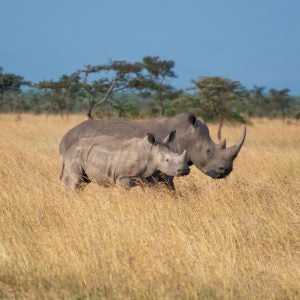
Around the world, many thousands of wild animals are exploited for human entertainment, food, fashion and frippery, or killed or injured through poisons and traps, not only causing immense animal suffering but also threatening many species with extinction. According to a UN report, species extinction is accelerating at an unprecedented rate, with direct exploitation by people a top threat. So here are Humane Society International’s top tips for how to be a wildlife warrior.
Teresa M. Telecky, Ph.D. vice president of wildlife at Humane Society International, says: “The best way to stop animal cruelty is to refuse to take part in it. By saying no to riding elephants in Asia who have been brutally captured and trained, by refusing to pose for selfies with wild animals exploited for their whole lives for tourism, and by mouse-proofing our homes and habits instead of reaching for the poison, we can all be wildlife warriors. Change starts with each of us, we have the power to make a difference for wildlife.”
Be an animal-friendly traveller
Avoid cruel and exploitative activities such as riding elephants and camels when on holiday. Elephant rides, treks and interactions are promoted to tourists in South Africa and across Asia, especially in India and Thailand. The elephants are usually caught as babies from the wild and brutally ‘broken’ to accept riders. A similar fate can face camels forced to give endless rides to tourists in Egypt. These animals perform repeated tourist duties without rest breaks or proper shade and refreshment. They receive little or no veterinary treatment for injuries, can be chained for hours, and suffer cruel training methods such as beating with whips and sticks. Instead of riding animals, hiring bicycles is a fun alternative, or take things slow on foot under your own steam.
Don’t mistake exploitation for entertainment
Exploiting wild animals in captivity is not acceptable as entertainment. The natural marine habitat of whales and dolphins, for example, cannot be replicated in captivity, and swimming with dolphins increases demand for captive animals, including from brutal “drive fisheries” such as the Taiji hunt in Japan. Unfortunately, dolphinariums can still be found in countries such as the United States, Japan, China, the UAE and many European countries like Greece and the Netherlands.
Poor quality zoos can also be an animal welfare nightmare, keeping wild species in deprived conditions which fail to meet their complex physical and psychological needs, and denying them proper care. Sadly, these can be found all over the world, and in countries like Indonesia, Thailand and China display can also involve forcing animals to perform circus-like acts for which they are subjected to repetitive and stressful training. It’s far better to see animals in the wild on a safari where you can observe their natural behaviour without disturbing them.
Don’t buy wild!
Souvenirs made from wild animal parts such as sea turtle shell, fur or ivory means that an animal has suffered for your trinket, and you may be supporting the poaching and trafficking of wild animals. Instead, support the local community by buying a painting, carving or animal-free craft item by a local artisan.
Say no to sad selfies!
Never pay to have your photo taken with wild animals such as parrots, monkeys or wild cats such as tigers at temples in South East Asia. These animals are often stolen from the wild and sedated with drugs to make them easier to handle. They can also be beaten, and have their teeth or claws removed. In South Africa, thousands of lions are bred in captivity and taken away from their mothers at an early age to be used as photo props for tourists. Once the cubs have grown bigger, they are used for ‘walking with lions’ tourist experiences, and then eventually sold to be killed in canned hunting operations or for the lion bone trade.
Reject ‘delicacy’ meat
The capture and consumption of wild animals such as bats, primates and rats sustains a vast global trade that not only causes immense suffering for hundreds of thousands of animals every year, and encourages exploitation of endangered species, but also poses a severe human health risk. The coronavirus crisis has been linked to the trade in wild animals for human consumption in wet markets in Wuhan, China, and this trade has spawned a number of global health crises in the past. More than 70 million sharks are also killed annually for shark fin soup. The trade involves cutting off a shark’s fin, often while the animal is still alive, and dumping the shark back into the sea to die slowly. Don’t be tempted to eat wild animals as “bucket list” items when traveling, as it merely perpetuates this brutal and often illegal trade.
Don’t wear fur
Millions of foxes, mink, raccoon dogs and coyotes die every year for fashion. Confined in small, wire-mesh cages on factory farms or captured by painful metal traps in the wild, their fur is turned into frivolous trim on coats, hats and accessories. These terrible conditions can create psychological disorders, causing animals to repetitively pace and even self-mutilate. Killing methods are brutal; mink are gassed and foxes and raccoon dogs are electrocuted or, in some countries like China, beaten to death. Fur is also incredibly polluting, as the dressing and tanning processes which stop the animal’s skin and pelt from decomposing naturally rely on toxic chemicals such as formaldehyde, cyanide, lead and chromium which can be released into waterways and devastate wildlife. The future of fashion is compassion, so choose a cruelty-free alternative fabric instead and leave fur where it belongs, on the animals!
Be nice to mice and rats
Wild animals like mice and rats are often subjected to cruel extermination methods such as slow poisoning or glue traps. Glue traps immobilise but don’t kill animals who get stuck in them. Small animals may be left to starve to death or die of their injuries over the course of hours, sometimes pulling or biting off their own limbs in a desperate attempt to escape the traps, or even suffocating from falling face-first into the glue. Using poison can not only cause mice and rats to suffer a slow and agonizing death, it is also a threat to other wildlife and pets who come into contact with the poisoned animal. It’s far kinder to rethink rats and mice as wild animals who live alongside us, but sometimes in unwanted places from which we must encourage them to leave. HSI advocates the use of non-lethal deterrent and eviction methods that are not only more humane but also more effective in the long term. By blocking access points, removing food sources, using welfare-friendly deterrents such as mouse-mesh, and as a last resort relocating individuals using a live-capture trap, we can keep our homes and gardens rodent-free. More information can be found here: https://www.hsi.org/news-media/humane-rodent-solutions/




